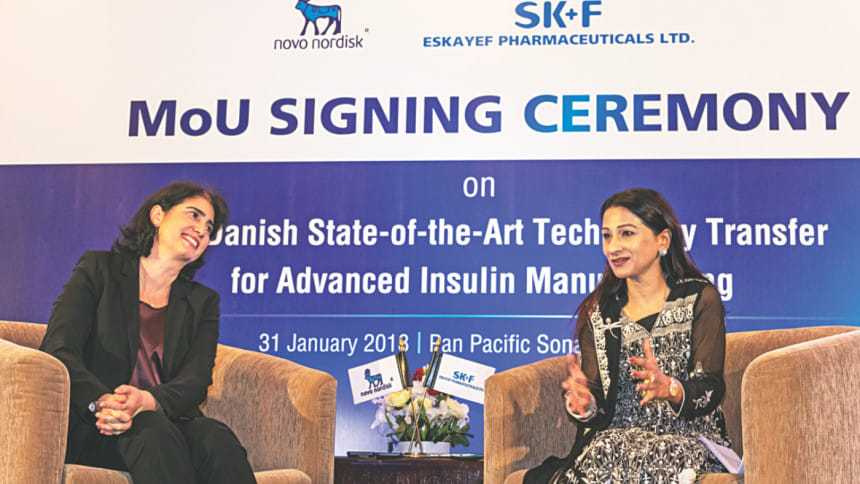Fight against diabetes takes a step forward

Novo Nordisk's goal to defeat diabetes took a significant step forward in Bangladesh last week after the Danish healthcare giant agreed to transfer its advanced proprietary technology to manufacture modern insulin products locally.
Typically, diabetic patients get insulin into their bloodstream by carefully drawing the requisite dosage out of a vial through a syringe and then subcutaneously injecting it with a needle.
But in 1985, Novo Nordisk came up with the insulin pen, which eliminated the need to dexterously measure the requisite dose out of the vial every time and carry and transport vials and syringes.
The insulin pen comes with an insulin cartridge, a needle attached to deliver the medication and a dial to measure the dose, thereby leading to accurate dosages.
Eskayef Pharmaceuticals, one of the top medicine-makers in Bangladesh, has been manufacturing human insulin vials for Novo Nordisk since 2012, but insulin pens are still imported from Denmark.
But now, under a new agreement signed in Dhaka on Wednesday insulin pens will be produced in Bangladesh as well, in a development that will make the convenient and reliable method of insulin intake more affordable for a wider number of people.
The Danish company has six such production facilities outside of its home country but this is the first time that it has partnered with a foreign company to set up a plant to manufacture insulin products with the Penfill technology.
Asked why Novo Nordisk has chosen Bangladesh to transfer the proprietary technology, Sebnem Avsar Tuna, its corporate vice-president for Oceania and Southeast Asia, said: “It is because of Eskayef.”
“It is a historic moment for both the companies,” said Simeen Hossain, managing director of Eskayef Pharmaceuticals.
With the number of patients growing in the diabetic sector, having this modern insulin manufactured locally in Bangladesh will benefit the country and the people of Bangladesh, she said.
The move shows Novo Nordisk's commitment to making the lives of diabetic patients in Bangladesh easier, Tuna told The Daily Star in an interview.
Tuna was in Dhaka recently to attend the signing of the preliminary agreement for the state-of-the-art production facility.
The production facility, which will be set up at a cost of Tk 300 crore, is expected to be complete in three years.
As many as 69 lakh people are living with diabetes in Bangladesh and the figure will double to 1.37 crore by 2045, according to the International Diabetes Federation.
“But if you look into the prevalence rates globally, it should be even much higher. That means there are many more patients, either not knowing that they are living with diabetes or are not able to get access to the treatment,” Tuna said.
Non-communicable diseases and particularly diabetes are a big burden not just because of the number of patients, but because of the economies of scale that it is coming up with.
“We say in Novo Nordisk, treating diabetes is not expensive, but not treating diabetes is very expensive,” Tuna said, while lauding the Danish pharmaceutical giant's long-lasting partnership with the Diabetic Association of Bangladesh.
Hossain went on to praise Novo Nordisk for the outstanding support it has extended to Eskayef in the past eight years.
“It has been a great learning for us. It has helped us develop our quality standard and take this quality standard across other aspects of the company.”
“Because of the core competency, we are able to manufacture and maintain the highest quality standards in terms of manufacturing and all the other aspects of the business, and also in the most ethical manner.”
Over the years, Eskayef has emerged as one of the leading pharmaceutical companies in Bangladesh.
Its state-of-the-art manufacturing facility has been approved by stringent global regulators, including the UK MHRA, European Medicines Agency, TGA Australia, VMD UK and the Unicef.
“That itself is an endorsement that we have the highest quality and we do maintain the highest quality, the global standards.”
The new insulin production facility will be housed at Eskayef's existing plant in Tongi.
Eskayef exports its products to different countries in Asia, Africa, Europe and Australia. Apart from Novo Nordisk, it has partnership with global companies such as Novartis and Servier.
Tuna said, as a global company, Novo Nordisk has a lot of standards in terms of quality in bio-technology, audits and good manufacturing practice requirements of the European Union, and the Food and Drug Administration of the US.
The same standards were required and asked of Eskayef when it started producing insulin for the Danish company in 2012, she said.
“They [Eskayef] have been so professional, delivering all those requirements,” Tuna added.
“Due to the high quality and the trust that has already been established many years back, we are confident that Eskayef will take it further in the highest technology for the best quality products of insulin.”
Hossain also talked about the growing presence of women business leaders in Bangladesh.
She said there are competent female leaders not just in the pharmaceutical industry but in all sectors.
“I think the most important thing in a leader is not the gender. A leader, be it a male or female, has to be competitively competent to sustain in this fast-paced industry or any industry for that matter.”
On her style of nurturing talent, Hossain said she does not believe that a leader alone can do everything.
“I believe in delegation and empowering my team. I think that is the success of Eskayef or Transcom Group. We delegate and we empower. I really don't believe in micromanagement. I believe any success is the success of the team as a whole, not one person.”

 For all latest news, follow The Daily Star's Google News channel.
For all latest news, follow The Daily Star's Google News channel. 



Comments